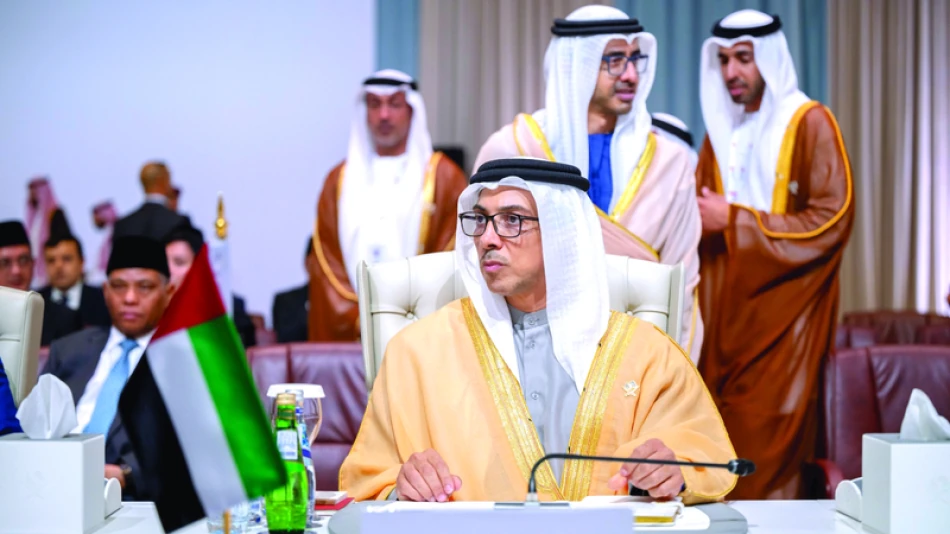
Arab-Islamic Emergency Summit Calls for Collective Security, Rejects Attack on Qatar
Arab and Islamic Leaders Unite Against Israeli Strike on Qatar, Demand International Action
Arab and Islamic leaders concluded an emergency summit in Doha with unprecedented condemnation of Israel's September 9 attack on Qatari territory, marking a potential turning point in regional diplomatic responses to Israeli military actions. The strike targeted a residential area housing diplomatic negotiation teams, killing civilians including a Qatari national and undermining Qatar's crucial role as a Gaza ceasefire mediator.
Targeting the Mediator: A Dangerous Escalation
The Israeli attack struck at the heart of ongoing diplomatic efforts to end the Gaza conflict. Qatar has served as the primary intermediary between Hamas and Israel, hosting negotiation teams in specially designated residential compounds in Doha. The September 9 strike hit this neutral diplomatic zone, along with nearby schools, nurseries, and diplomatic missions.
This represents a significant escalation in Israel's regional strategy. By targeting the mediator rather than just the parties to the conflict, Israel has effectively attacked the peace process itself. The summit's final communique emphasized that such actions "undermine international mediation and peace-making processes" and hold Israel fully responsible for the consequences.
Regional Response: From Condemnation to Concrete Action
The summit, led by UAE Vice President Sheikh Mansour bin Zayed Al Nahyan representing the UAE delegation, produced more than diplomatic rhetoric. Leaders approved a comprehensive response framework that includes:
Legal and Diplomatic Measures
Member states committed to supporting International Criminal Court arrest warrants issued November 21, 2024, against individuals responsible for crimes against Palestinians. The summit also called for reviewing Israel's UN membership, citing violations of membership conditions and continued disregard for UN resolutions.
Economic and Military Sanctions
Leaders urged all nations to impose sanctions on Israel, suspend arms transfers including dual-use materials, and review diplomatic and economic relations. This represents the most coordinated Arab-Islamic sanctions call since the 1973 oil embargo.
Qatar's Strategic Dilemma
The attack places Qatar in an unprecedented position. As a key US ally hosting major American military installations, Qatar must balance its mediation role with security concerns. The emirate's measured response—emphasizing international law rather than military retaliation—reflects this delicate balance.
Qatar's continued commitment to mediation, despite being targeted, demonstrates the kingdom's strategic importance in regional diplomacy. However, the attack may force Qatar to reconsider its open-door policy for sensitive negotiations, potentially moving future talks to more secure locations.
Implications for Gaza Ceasefire Efforts
The strike on Qatar's mediation infrastructure threatens to derail already fragile ceasefire negotiations. With Egypt, Qatar, and the United States serving as primary mediators, any disruption to this trilateral framework significantly reduces chances for breakthrough agreements.
The summit's emphasis on supporting reconstruction efforts in Gaza, including plans for a Cairo-hosted donor conference, suggests Arab states are preparing for post-conflict scenarios despite current negotiation challenges.
Regional Security Architecture in Flux
The summit welcomed Arab foreign ministers' "Shared Vision for Regional Security and Cooperation," signaling movement toward collective security arrangements. This initiative, driven by recent Israeli actions against multiple regional states including Lebanon, Syria, and Iran, reflects growing consensus that current security frameworks are inadequate.
The emphasis on "collective security and shared destiny" among Arab and Islamic states suggests a potential shift from bilateral to multilateral security approaches, similar to NATO's Article 5 collective defense principle.
International Court Proceedings Gain Momentum
The summit's call for supporting International Criminal Court arrest warrants and International Court of Justice provisional measures indicates growing confidence in legal approaches to Israeli actions. The January 26, 2024 ICJ ruling on genocide prevention in Gaza provides a legal framework that Arab states are now actively promoting.
This legal strategy represents a significant evolution from purely diplomatic protests to concrete international law enforcement, potentially creating precedents for future conflicts.
Economic Reconstruction and Political Solutions
Despite ongoing conflict, the summit approved detailed reconstruction plans for Gaza, indicating confidence that current hostilities will eventually end. The Arab-Islamic reconstruction initiative, combining political and technical components, positions regional states as primary post-conflict stakeholders rather than leaving reconstruction to international donors alone.
The September 22, 2025 two-state solution conference, co-hosted by Saudi Arabia and France, provides a concrete timeline for diplomatic initiatives, suggesting coordinated international pressure for Palestinian statehood recognition.
Looking Ahead: Consequences and Calculations
The Doha summit represents more than traditional Arab diplomatic solidarity. By targeting Qatar—a crucial US ally and regional mediator—Israel has potentially overreached, creating unprecedented unity among Arab and Islamic states while complicating its own strategic objectives.
The comprehensive response framework, from legal proceedings to economic sanctions, suggests regional states are moving beyond symbolic gestures toward coordinated action. Whether this translates into sustained pressure or remains largely rhetorical will determine the summit's ultimate significance for Middle Eastern geopolitics.
Most Viewed News

 Sara Khaled
Sara Khaled






